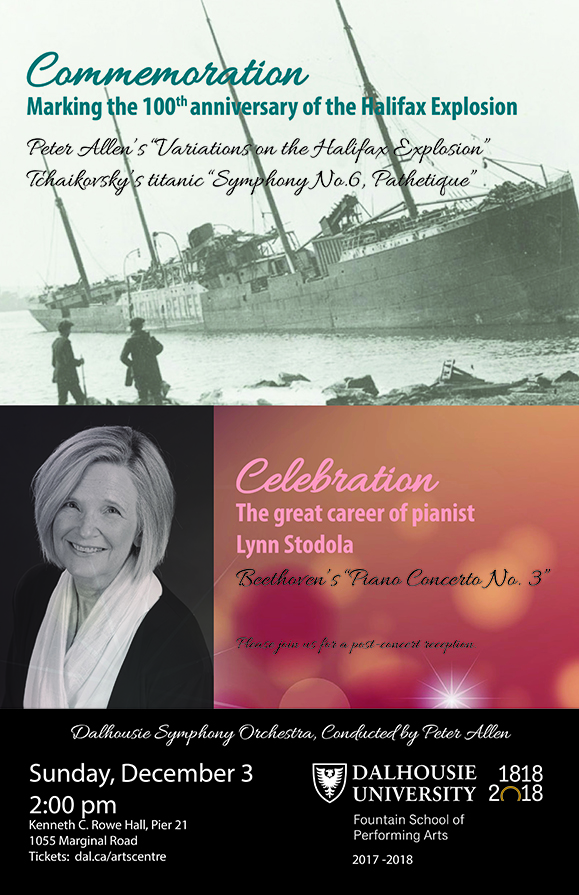‚ÄúIn prchestra there are so many colours. [There are] so many different sounds‚Ķ The percussion, and brass, all the strings and winds‚Ķ You [can] just come and let the sound enrapture you and embrace you.‚ÄĚ
Fountain School Professor Peter Allen speaks passionately about music, making a strong case for why those unfamiliar with classical pieces should take the plunge with the Dalhousie Symphony Orchestra’s December 3 concert Commemoration & Celebration at Pier 21.     
The concert occurs nearly 100 years to the day after the Halifax Explosion, at the time the largest artificial explosion in history, one that decimated much of Halifax and Dartmouth, claiming the lives of close to 2,000 people.
Picture the scene that day: in horrific slow motion, two ships collide in the harbor, sparking a fire and subsequent explosion that sends shockwaves over 20 times the speed of sound as far as Prince Edward Island and Cape Breton. The impact is so catastrophic that in the 1940s, Robert Oppenheimer and his research team will study it closely in their work developing the atomic bomb. Chaos erupts through a cacophony of sounds; windows shattering, fires blazing and people screaming as they lay trapped in their homes.
While it may seem impossible to derive music from such explosive tragedy, Allen, a native Haligonian, has succeeded with his arrangement Variations on the Halifax Explosion. This commemorative piece unfolds the ‚Äúfirst 12 minutes after the explosion... [The] damage to the land [and the] people. The anger‚Ķ the confusion‚Ķ‚ÄĚ. Allen‚Äôs piece challenges the orchestra‚Äôs musicians emotionally as well as technically, as the music involves a dramatic range of sounds and textures.
Paying tribute
This particular Dalhousie Symphony Orchestra concert, much as its title suggests, has another, more hopeful, side to it: it will honour pianist Lynn Stodola, New York Times acclaimed pianist and beloved longtime Dalhousie professor.
 She will be performing Beethoven's optimistic and celebratory¬†Piano Concerto No. 3¬†to acknowledge her final teaching year at pilipili¬ĢĽ≠. Allen reflects that he ‚Äúthought it would be a good way to honour [Lynn] and celebrate the work that she‚Äôs done with Dal and the community.‚ÄĚ The concerto‚Äôs musical language depicts an intense emotional journey from despair to delight in its three movements.
She will be performing Beethoven's optimistic and celebratory¬†Piano Concerto No. 3¬†to acknowledge her final teaching year at pilipili¬ĢĽ≠. Allen reflects that he ‚Äúthought it would be a good way to honour [Lynn] and celebrate the work that she‚Äôs done with Dal and the community.‚ÄĚ The concerto‚Äôs musical language depicts an intense emotional journey from despair to delight in its three movements.
The dual themes of commemoration and celebration will be wedded at the end of the concert in ‚ÄúTchaikovsky's titanic¬†Symphony No. 6 in B minor,ŐżĪ ≤Ļ≥Ŕ≥ů√©≥ŔĺĪĪÁ≥‹Īū.‚ÄĚ First performed in 1893, only nine days before Tchaikovsky‚Äôs death, this piece was described by the composer as ‚Äúthe best thing I ever composed or shall compose. ¬†Tom Service writes in The Guardian that ‚Äú[Ī ≤Ļ≥Ŕ≥ů√©≥ŔĺĪĪÁ≥‹Īū is] a work whose existence proved to [Tchaikovsky] that he had found a way out of a symphonic impasse, which represented a return to the heights of his achievement as a composer‚Ķ‚ÄĚ The themes of memory and lamentation in the piece serve as an apt vessel for Stodola, and provide sounds of endings and the concept of new beginnings.
When asked about the concerts themes, principal violist Zachary Levin says ‚Äú[It has a] pretty diverse musical selection. I didn‚Äôt grow up in Halifax, so I didn‚Äôt have the history [of the explosion] instilled in me. It is a very important event to recognize‚Ķ Just over the past couple of years I‚Äôve seen how significant it is.‚Ä̬† On performing alongside Stodola, Levin says she‚Äôs inspiring to watch. ‚ÄúI really enjoy her playing.‚ÄĚ
To many, the idea of attending an orchestral concert can be daunting, especially to those unfamiliar with classical music. For anyone who may be hesitant, Peter Allen wisely suggests to go along for the ride.
‚ÄúSometimes audience members put too much pressure on themselves to [understand everything] ‚Ķ Just come and experience it.¬† It‚Äôs like looking at a piece of art.¬† Do we all interpret the same thing? ¬†Surround yourself with the sound‚Ķ That‚Äôs the great thing about coming to the orchestra.‚ÄĚ
Commemoration and Celebration takes place on Sunday, December 3 at 2 p.m. in Kenneth C Rowe Hall at Pier 21. Advance tickets are available from the .


